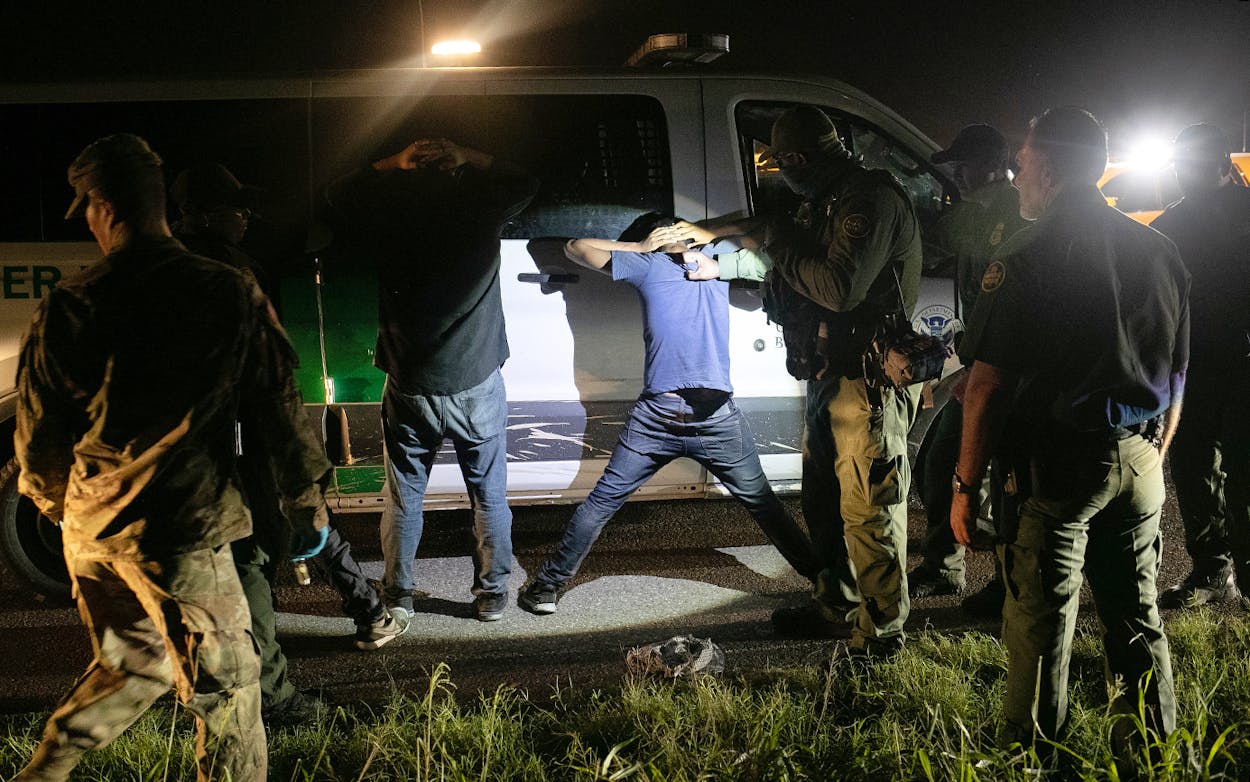The Texas/Mexico border sits at the epicenter of our nation’s ongoing fights over immigration. To avoid overlooking the hugely significant news emanating from the region, we’ll periodically round up the stories most worth your attention.
1. Immigration policies violate due process and civil rights, according to government agency.
The United States Commission on Civil Rights—an independent, bipartisan commission of the federal government—released a report on Thursday raising serious concerns about the Trump administration’s handling of border policy. In a report titled “Trauma at the Border: The Human Cost of Inhumane Immigration Policies,” the agency was scathing in its assessment of the administration’s policy.
The report, which runs nearly two hundred pages, includes recommendations for the administration, including reunification of all remaining separated children with their parents, greater oversight of detention centers, and congressional legislation setting new standards for those facilities as well as a requirement that no funds be used for the detention of asylum seekers whose fear of persecution in their home country is found to be credible.
This isn’t the first time that the commission has weighed in on border policy. As U.S. News and World Report notes, it most recently examined the issue in 2015, and was also critical of the Obama administration’s policy of holding children and their parents together in jail-like family detention centers. The recommendations weren’t implemented by the Obama administration, and it’s extremely unlikely that the Trump administration takes action as a result—but if you’re looking for an extensive look at the immigrations system, the commission’s work on the subject is quite thorough.
2. Border Patrol misconduct arrests at a five-year high.
Quartz obtained a copy of an internal government report documenting criminal misconduct claims against agents of Customs and Border Protection, which includes the Border Patrol. From fiscal years 2017 to 2018, the number of arrests rose from 254 to 286, an 11 percent increase.
The bulk of the allegations against the agents are for drug and alcohol offenses, according to the report, with domestic violence allegations not far behind. As Quartz notes, the total arrest rate among CBP agents is at roughly half a percent—five times the rate among other law enforcement agencies. That increase might be related to the administration’s attempt to rapidly expand the agency via executive order, even as it experiences sustained turnover among staff. Former CBP internal affairs head James Tomsheck told Quartz that there’s “a clear relationship” between hiring sprees and criminal misconduct, pointing back to a 2012 audit of the system.
3. More undocumented arrests and asylum claims coming from Mexico.
Last week, we learned that Mexico is once again the country producing the largest number of people seeking asylum in the U.S. Arrests of Mexicans are up 25 percent, while the number of Guatemalan, Honduran, and Salvadoran migrants has declined.
For asylum-seekers from Central America and beyond looking to enter the U.S. at the Mexican border, the government’s “Remain in Mexico” policy requires them to wait in Mexico for the chance to present their claim in the U.S. Though Mexican citizens seeking to flee violence or persecution in their own country aren’t subject to that policy, another border practice—strictly limiting the number of people allowed to cross into the U.S. at international bridges to make asylum claims—is stranding Mexicans south of the border, unable to follow the formal asylum process. This “metering” policy may be may be illegal.
Violence in Mexico is very real at the moment.Last week, a battle erupted on the streets of Sinaloa between members a faction of the Sinaloa cartel and the Mexican military over the arrest of the son of Joaquín “El Chapo” Guzmán. To end the violence, the Mexican government surrendered Guzmán to the cartel.
The practice of metering goes back to at least 2016, though it seems to have become more draconian under the Trump administration. Without a way to present themselves to U.S. authorities to claim asylum, “thousands of Mexican adults and children have been camping out in lines at U.S. border crossings, sleeping in tents while awaiting a chance to apply for safe refuge.” Given the surge in arrests, it seems more than plausible that many of the Mexican asylum-seekers are choosing to cross illegally, seeing no other options.
4. Voter registration among citizens who immigrated to the U.S. on the rise.
The Trump administration’s hostility toward immigrants has long been a part of the president’s larger political rhetoric. According to the Los Angeles Times, though, it’s also energizing a segment of the immigrant population with the power to respond: those who qualify for naturalization, and are thus eligible to vote in the 2020 election.
In the 2018 midterms, immigrants made up 8 percent of the electorate—more than double their share twenty years ago—with Texas among the top states for them to call home. According to the Times, the number of newly minted citizens who choose to register to vote at their naturalization ceremonies is increasing, too. The paper noted that at a recent ceremony, 85 percent of the new Americans sought to exercise their right. With more than 700,000 immigrants receiving citizenship each year, that’s an impressive number of new voters entering the electorate.
The paper is quick to point out that “immigrants” aren’t a monolithic voting bloc; they come from countries all over the world, and have political beliefs as various as any other group of people from different backgrounds. The Times did focus on one new citizen with an interesting perspective. Seventy-four-year-old Hans Gottwald of Alvin, Texas, has lived in the U.S. as a permanent noncitizen resident since 1963. He came here after immigrating from Germany and serving in the U.S. Army. The next election will be his first as a voter, despite decades of living in the country—and it was the impetus for his decision to finally obtain citizenship. “2020 is very important to me,” he told the Times—and while he’s officially undecided, he told the paper that he’s a fan of Elizabeth Warren.








